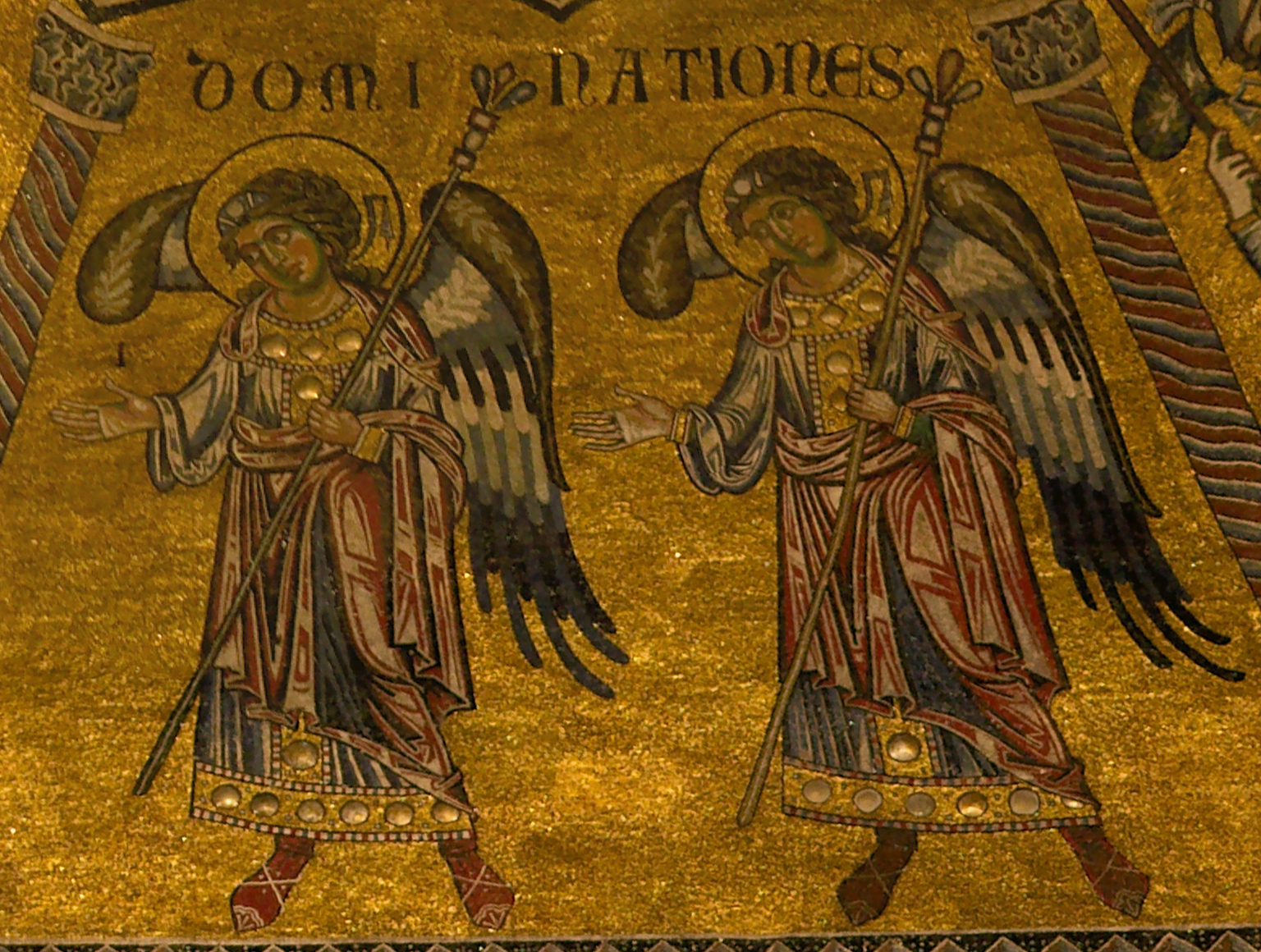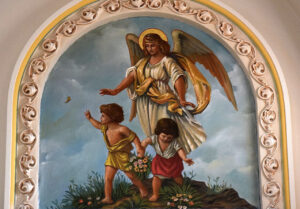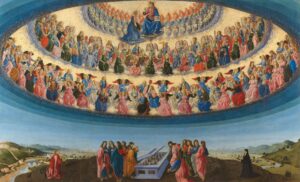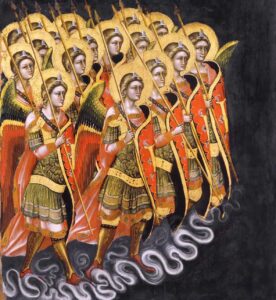Featured image: Mosaic portraying dominions at the Florence Baptistery. User:MatthiasKabel, cropped by User:Sailko, CC BY-SA 3.0, via Wikimedia Commons.
Key Takeaways
- Role in the Hierarchy: Dominions are intermediary angels who oversee and regulate the lower orders to maintain divine order.
- Symbols of Authority: Often depicted with crowns, scepters, and orbs, Dominions symbolize divine governance and justice.
- Divine Justice Enforcers: They embody and uphold cosmic justice, ensuring that all aspects of creation align with God’s will.
- Detachment from Humanity: Unlike Archangels, Dominions do not directly interact with humanity, focusing instead on the broader structure of the cosmos.
- Models of Ideal Governance: Dominions exemplify authority exercised with humility, self-restraint, and commitment to the greater good.
- Comparative Mythology Parallels: Similar to other mythological figures like Zoroastrian Amesha Spentas and Hindu devas, they reflect universal themes of cosmic balance and justice.
- Modern Relevance: Today, Dominions serve as symbols of ethical leadership, balanced authority, and the pursuit of order amidst chaos.
Within Christian angelology, angels are organized into a structured hierarchy, with each rank serving a distinct role. Among the nine choirs of angels, the Dominions (or Dominations) hold a unique and intriguing place. Positioned in the Second Sphere (or Triad), they serve as intermediaries between the higher, contemplative orders (like the Seraphim) and the more earthly-focused orders (like the Archangels). Unlike the Archangels who engage directly with humanity, Dominions act as cosmic administrators, ensuring that divine order permeates both heaven and earth.
Let us explore the role, symbolism, and theological significance of the Dominions within the celestial hierarchy, and how their function resonates with broader themes of governance, justice, and harmony. Understanding the Dominions not only offers insights into Christian cosmology but also reflects universal ideals that resonate across cultures and eras.
Table of Contents
The Role and Function of Dominions
Governance and Administration
The Dominions’ name, derived from the Latin dominatio, implies command and control. Their primary function is to govern and oversee lower-ranking angels, ensuring that divine will flows smoothly throughout the hierarchy. Unlike angels who interact with the material world, the Dominions focus on maintaining order within the angelic ranks. Acting as managers, they relay God’s instructions to subordinate angels, ensuring that every part of creation aligns with divine purpose.
Enforcers of Divine Justice
In addition to governance, Dominions uphold divine justice by enforcing the spiritual laws that maintain cosmic harmony. Unlike Thrones, who represent God’s judgment, Dominions are responsible for ensuring that every angelic choir fulfills its role according to divine law. By embodying the principles of balance and order, they help sustain a universe where each being acts in accordance with God’s will. This enforcement of justice extends beyond reward and punishment—it’s about preserving a divine structure that reflects higher cosmic truths.
Absence of Direct Human Interaction
Dominions rarely interact with humanity. Their work is largely hidden, operating on a plane beyond human perception. This distance from earthly matters emphasizes their role as custodians of divine order rather than individual protectors or messengers. By remaining detached, they symbolize the impartial governance of the cosmos, concerned with maintaining universal harmony rather than personal engagement.
Theological Implications of Their Role
The Dominions’ role in angelology carries significant theological weight. As divine administrators, they embody Christian ideals of authority, justice, and hierarchy. They serve as models of leadership, reflecting a form of governance that prioritizes cosmic order over personal ambition. In this way, Dominions inspire earthly rulers to govern selflessly and uphold justice, mirroring the structured, impartial order that sustains creation.
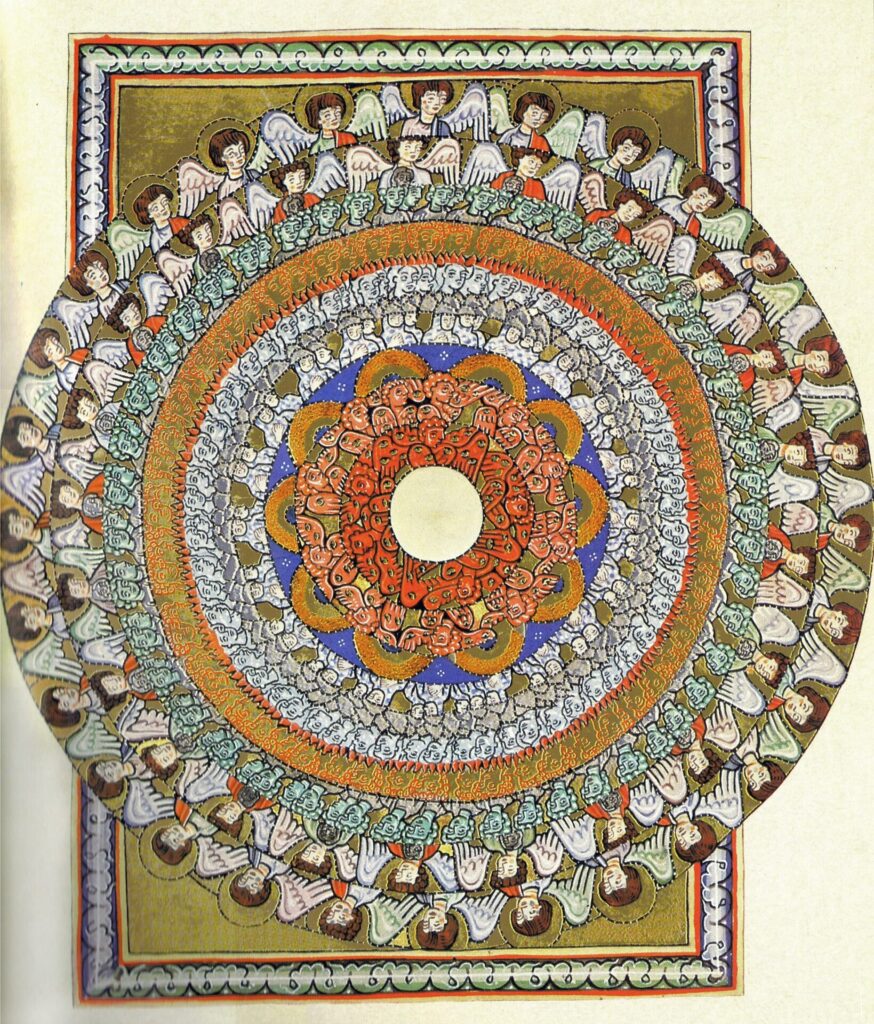
Symbolism and Iconography of Dominions
In Christian art, Dominions are often depicted with symbols of authority that emphasize their role in maintaining order and justice.
Scepters and Orbs: Symbols of Authority
The Dominions are frequently portrayed holding a scepter and orb, classic symbols of rule and control. The scepter signifies their delegated power to issue commands across the angelic hierarchy, while the orb represents their dominion over creation. Together, these symbols convey the Dominions’ responsibility to uphold divine order without intervening directly in human affairs.
Crowns and Regal Attire: Symbols of Divine Governance
Dominions are often depicted wearing crowns and elaborate robes, which signify their high status within the hierarchy. The crown represents their role as rulers under God’s authority, while the robes convey their connection to the divine throne. These symbols reinforce their role as embodiments of divine governance, emphasizing justice and impartial authority.
Artistic Depictions Throughout History
In medieval and Renaissance art, Dominions are often included in depictions of the heavenly choirs, adorned with symbols of rulership. Artists like Fra Angelico portrayed them with serene expressions and regal attire, reflecting their detached oversight. Medieval manuscripts also depict them in layered compositions, emphasizing their role as intermediaries between higher and lower angels.
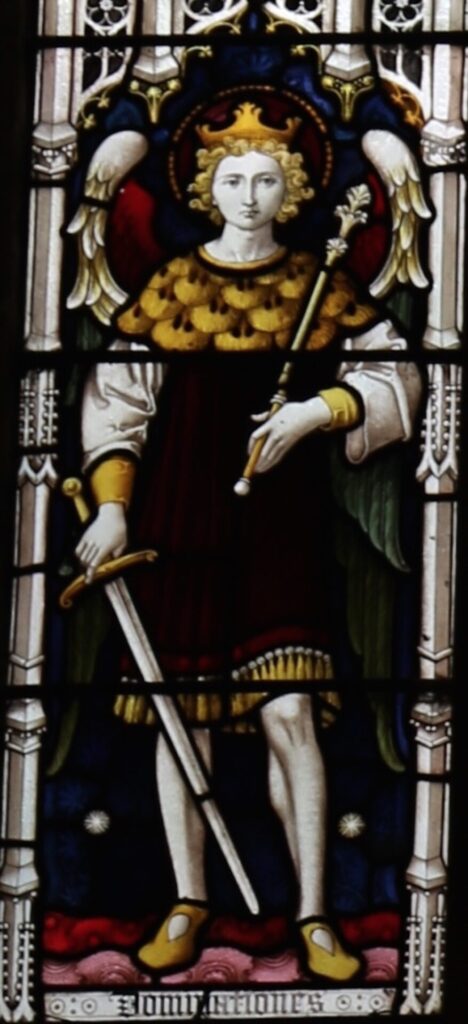
Theological Interpretations of Dominions
Christian thinkers, from Pseudo-Dionysius to St. Thomas Aquinas, have contributed to our understanding of the Dominions’ role in the celestial hierarchy.
Pseudo-Dionysius and the Celestial Hierarchy
Pseudo-Dionysius the Areopagite, a 5th-century Christian mystic, introduced the concept of the nine angelic orders in The Celestial Hierarchy. He described the Dominions as “ordering the angelic ranks in alignment with divine will,” positioning them as conduits through which divine governance flows. For Pseudo-Dionysius, the Dominions embody an “active contemplation” of God, governing the universe while remaining aligned with divine order.
St. Thomas Aquinas and Angelic Governance
In the Summa Theologica, St. Thomas Aquinas expanded on Pseudo-Dionysius’s ideas, emphasizing the Dominions’ role in maintaining order without direct involvement. Aquinas saw them as ideal models of authority, governing with wisdom and impartiality. Their detachment from personal ambition serves as a template for Christian rulers, who are called to exercise power in service of justice rather than personal gain.
Medieval Perspectives on Justice and Order
Medieval theologians associated the Dominions with justice and the protection of earthly rulers. Influenced by Pseudo-Dionysius and Aquinas, they viewed the Dominions as examples of how to govern in alignment with divine law. This interpretation reinforced the notion that earthly leaders should model themselves after the impartial, detached governance of the Dominions, prioritizing the common good over individual interests.
Comparative Mythology: Parallels in Other Traditions
The role of the Dominions as divine administrators has parallels in other religious and mythological traditions, reflecting a universal fascination with the concept of cosmic order.
Zoroastrianism: The Amesha Spentas and Asha
In Zoroastrianism, the Amesha Spentas serve as divine beings who assist Ahura Mazda in maintaining cosmic order. Asha Vahishta, representing truth and order, echoes the Dominions’ role in upholding justice. Both traditions depict divine beings dedicated to preserving a cosmic harmony that reflects higher truths.
Hinduism: Devas and Dharma
In Hindu cosmology, devas are celestial beings responsible for upholding dharma, the cosmic law. Figures like Indra and Yama represent aspects of justice and order similar to the Dominions. While Indra maintains cosmic stability, Yama enforces moral order, reflecting the Dominions’ role in overseeing the spiritual structure of creation.
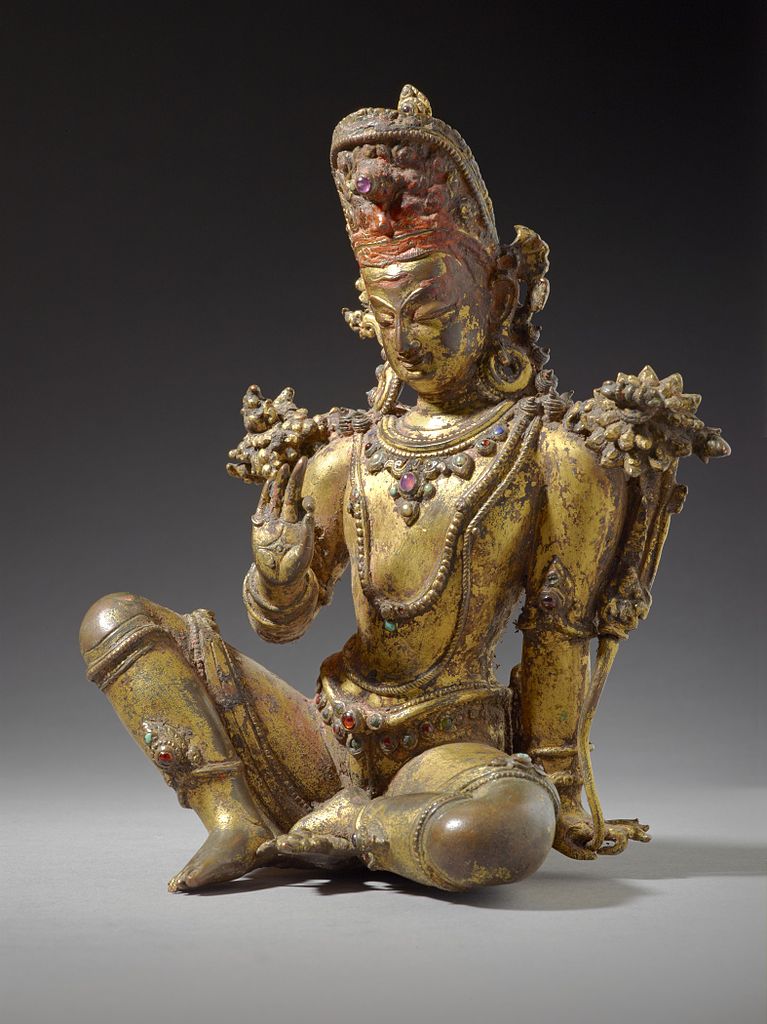
Ancient Greek Religion: Daimones and Cosmic Mediation
The Greek daimones, or intermediary spirits, serve a role similar to that of the Dominions by mediating between gods and mortals. Although not structured in a strict hierarchy, certain daimones, such as Dike (justice), embody themes of balance and cosmic order that align with the ideals upheld by the Dominions.
Norse Mythology: Aesir and the Guardianship of Order
In Norse mythology, gods like Odin and Tyr are guardians of cosmic order. Odin’s wisdom-seeking and Tyr’s commitment to justice echo the Dominions’ duty to uphold balance and enforce divine law. Both traditions emphasize the role of spiritual beings in maintaining a structured universe against chaotic forces.
Contemporary Relevance and Symbolic Meaning
The Dominions’ qualities—justice, balance, and authority—have timeless appeal. In a world marked by rapid change and social division, they offer a model for ethical governance and personal integrity.
Ethical Leadership and Humble Governance
The Dominions’ detached and impartial authority serves as a model for ethical leadership. They remind us that true power lies in serving the greater good, a concept relevant to leaders in all fields. Their selfless governance reflects ideals that encourage leaders to prioritize justice over personal ambition.
Symbols of Balance and Stability
The Dominions’ role in upholding cosmic harmony resonates in a world often marked by chaos. Their symbolism of balance and stability offers inspiration for those seeking order and justice in turbulent times.
Archetypes of Discipline and Self-Control
As beings of immense power who govern with restraint, the Dominions illustrate the value of disciplined authority. Their example encourages individuals and leaders alike to exercise self-control, demonstrating that true strength lies in wise oversight rather than indiscriminate exertion of power.
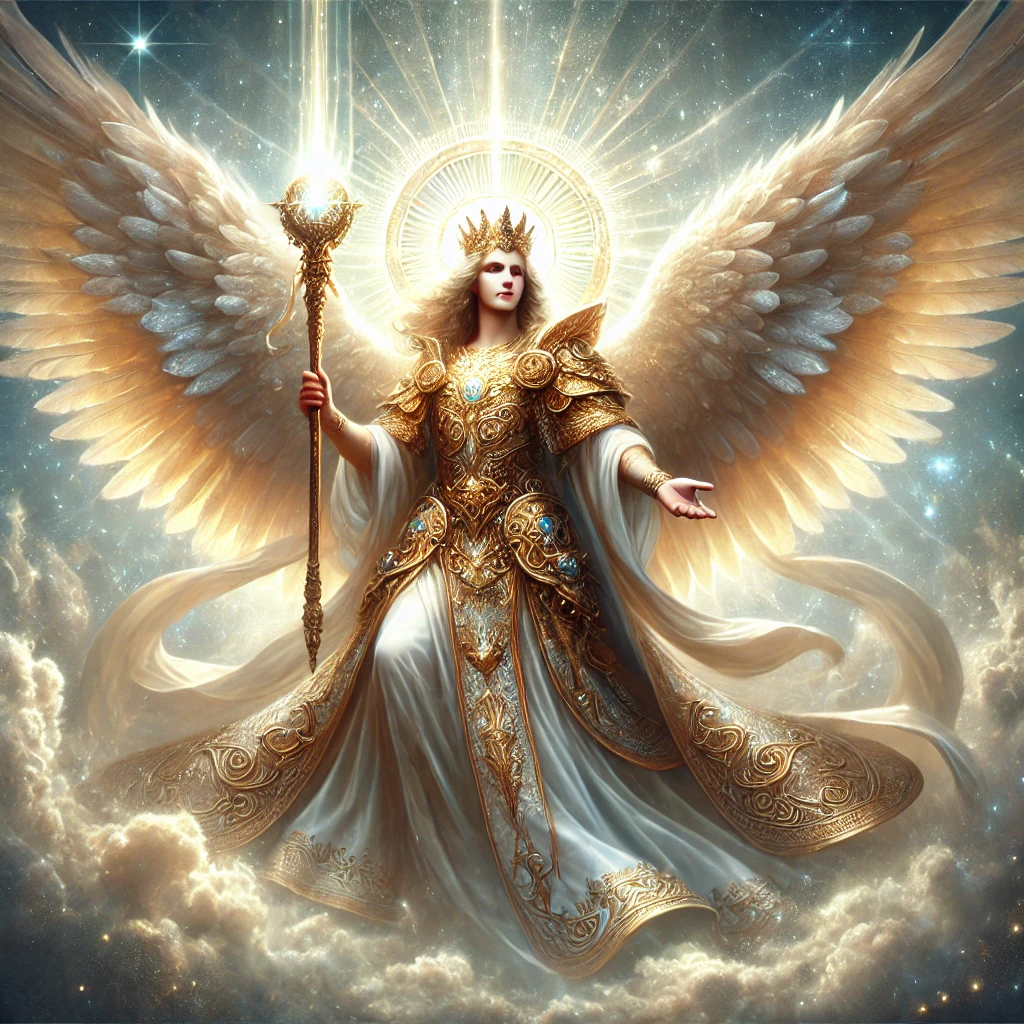
Conclusion
The Dominions occupy a profound place in Christian angelology as divine administrators who embody ideals of justice, balance, and ethical authority. Through their governance, they sustain cosmic harmony, embodying values that resonate with both historical and contemporary audiences. In art, literature, and theological thought, they stand as reminders that true authority is grounded in humility, justice, and a commitment to the common good.
Whether viewed as theological figures or as archetypes of responsible leadership, the Dominions offer timeless lessons on the nature of governance and the pursuit of harmony. Their enduring appeal speaks to a universal human desire for balance, justice, and integrity—values that continue to inspire in an ever-complex world. By contemplating the Dominions, we are reminded of the possibility of order amidst chaos, and of leadership that serves rather than dominates, in alignment with a higher ideal.

